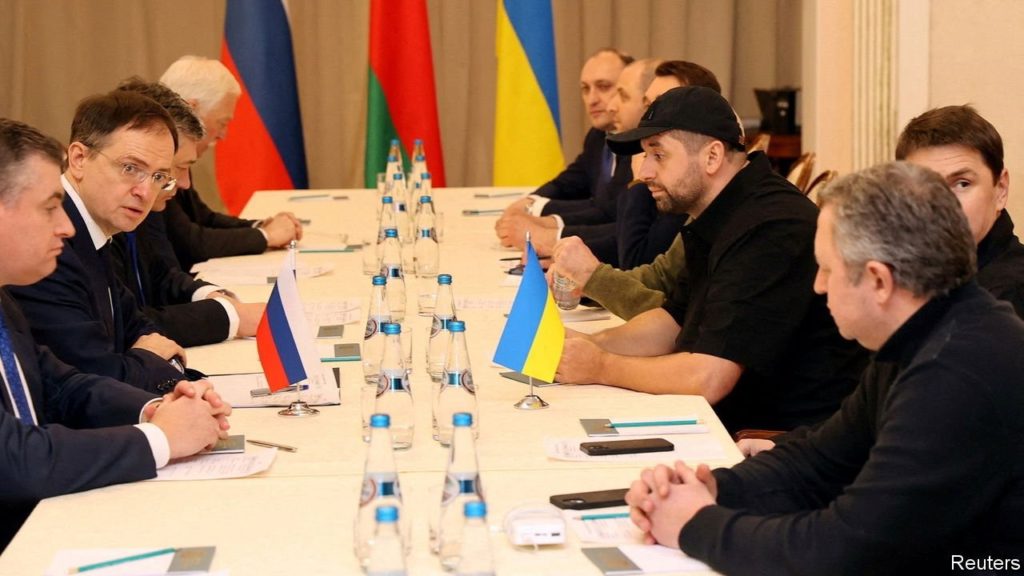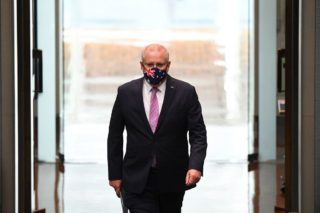
KYIV — AT A SECRET location in a blacked-out highrise in the suburbs of Kyiv, a senior Ukrainian intelligence officer shared what he claimed was Russia’s invasion blueprint. The classified document, supposedly compiled before Russian troops crossed the border, envisages the complete takeover of Ukraine: seizing private property and taking over banks, transport, ports and elected institutions. There are provisions for a federation of puppet “peoples’ republics” and perhaps their annexation into Russia if needed. There is a line about “denazifying” the Ukrainian education system, whatever that means.
Compared with this totalitarian wishlist, peace negotiations with Russia appear to be headed to a more reasonable place. Russia is making four main demands: a declaration of Ukrainian neutrality; Ukraine’s formal acceptance that Crimea, which Russia seized in 2014, is Russian territory and that the Donbas region in eastern Ukraine, which is controlled by separatists backed by Russia, is independent; the demilitarisation of Ukraine; and relief for Russia from Western sanctions. Ukraine, for its part, appears ready to agree to several of these demands, including giving up on the prospect of NATO membership and accepting some sort of compromise on the occupied territories. Turkish and Israeli interlocutors are hailing what they describe as progress bringing the two sides together.
But there are two big sticking-points. The first is Russia’s maximalist definition of demilitarisation. It wants Ukraine to reduce its army to 50,000, a fifth of its current size. After a month of bloody sacrifice, few in Ukraine are anywhere near ready to agree to such a cut. The second is the Ukrainian belief that Vladimir Putin will not pull his forces from areas of eastern and southern Ukraine they have conquered, or are about to conquer. There is bitter experience here: Russian troops remained in Donbas despite being required to withdraw under the Minsk agreements of 2014-15.
Secondary discussions relate to the scope of new security guarantees for Ukraine. The talk has been of a formula involving the five permanent members of the UN Security Council plus Turkey; yet it is far from clear that the Western members (America, Britain and France) are ready to provide the unconditional guarantees that Ukraine is seeking. Both sides have agreed to keep the details of the talks secret. Ukraine’s president, Volodymyr Zelensky, has already indicated that any proposed settlement would be subject to a referendum. The Kremlin’s immediate response to this idea was to say that progress had become “slower and less substantive than needed”. Russian approval for any deal would no doubt come more quickly, dependent as it is on the will of just one person. But it remains to be seen whether Mr Putin is really ready to compromise, or indeed whether his negotiators have a genuine mandate.
With a revealing pause and nervous laugh, the intelligence official said it was Russia’s questionable sincerity that made him pessimistic about the prospects of the negotiations. They might offer the best opportunity to avoid the “nightmarish” scenario of a protracted conflict and “Syriaisation”, or division of Ukraine into warring regions, he said. But Mr Putin did not appear to be taking the talks anywhere near as seriously as Ukraine is. That was clear in the “second tier” negotiation team he sent. “Moscow has always used peace talks to manipulate the agenda. Just like they have accused us of bombing our own people and homes.” The official predicted that Russia would continue an offensive to secure gains in the south and east of the country, completing its brutal siege of the port of Mariupol, before attempting to deny Ukraine access to the sea altogether with a renewed assault on Odessa.
Ukraine’s negotiating position has been strengthened by Russia’s surprisingly mediocre military performance. The level of professionalism has varied greatly: better in units facing Ukraine’s elite forces in the south-east, much worse in the north and north-east and around Kyiv. There, Russian planners appear to have badly miscalculated, adopting a military posture that assumed minimal resistance. What is more, they failed to prepare adequately even for that rosy scenario. The intelligence officer said that Russia had gone ahead with its attack without even elementary co-ordination of its military units. It was a “miraculous” display of negligence, or sabotage, he said, which has had predictable consequences in the numbers of dead and injured.
Ukraine says Russia has lost more than 15,000 soldiers since the start of the conflict, a claim that many assume to be a wild exaggeration. But on March 21st a report in Komsomolskaya Pravda, a reliably pro-government Russian newspaper, suggested that as many as 9,861 Russian soldiers had died so far, with a further 16,153 wounded. That would put roughly 13% of the original invasion force out of action, and compares badly with the total losses endured by the Soviet Union during a decade of war in Afghanistan, when some 15,000 died. The Russian tabloid later claimed that it had been hacked and removed the numbers. But even if the report was not correct, the rate of attrition seems high enough to give the Kremlin an incentive to seek a negotiated peace.
Mr Zelensky has once again called for a face-to-face meeting with Mr Putin, who has so far turned down the chance to talk. Negotiations had to succeed, Mr Zelensky said, because the alternative was a “third world war”. His intelligence officer was less optimistic, predicting that war would continue until Russian forces were “completely exhausted”. Did Ukraine have the resources to bring that about? “We have to have them,” he said. “Because we don’t have an option. We want to stay alive.”
By The Economist




